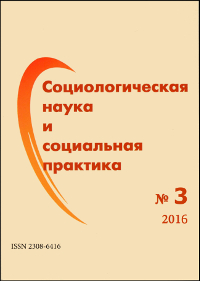Социобиотехнические системы: новый взгляд на взаимодействие человека и природы
Аннотация
Литература
Бауман З. Текучая современность. - СПб: Питер, 2008. - 240 с.
Будыко М. И. Глобальная экология. - М.: Наука, 1977. - 231 с.
Валлерстайн Э. После либерализма. - М.: Едиториал УРСС, 2003. - 256 с.
Вернадский В. И. Проблемы биогеохимии // Труды биохимической лаборатории. Вып. 16. - М.: Наука, 1980. - 320 с.
Гнатюк Н. Политическая субъектность Европейского Союза // Международные процессы. - 2014. - № 12 (4). - С. 32-48.
Ермолаева П. О. Социально-экологический метаболизм городов: концептуализация, на¬учные школы, современные зарубежные исследования // Социологическая наука и социальная практика. - 2015. - № 3 (11). - С. 34-50.
Капица П. Л. Эксперимент, теория, практика. - М: Наука, 1981. - 495 с.
Коммонер Б. Замыкающийся круг. Природа, человек, технологии. - Л.: Гидрометеоиздат, 1974. - 146 с.
Кравченко С. А., Салыгин В. И. Усложняющиеся опасности и риски современного маги-стрального нефтепроводного транспорта // Социологическая наука и социальная практика. - - № 4(8). - С. 50-66.
Пригожин И., Стенгерс И. Порядок из хаоса. Новый диалог человека с природой. - М.: Едиториал УРСС, 2001. - 432 с.
Сорокин П. А. Социальная и культурная динамика: Исследование изменений в больших системах искусства, истины, этики, права и общественных отноше¬ний. - СПб.: ЗГХИ, 2000. - 1056 с.
Сорокин П. А. Голод как фактор. Влияние голода на поведение людей, соци¬альную организацию и общественную жизнь. — М.: Academia; LVS, 2003. — 684 с.
Форрестер Дж. Динамика развития города. — М.: Прогресс,1974. — 287 с.
Чижевский А. Л. Физические факторы исторического процесса. — Калуга: 1-я Гостиполитография. 1924. — 123 с.
Чижевский А. Л. Земное эхо солнечных бурь. — М.: Мысль, 1964. — 235 с.
Яницкий О. Н. Социально-информационные процессы в обществе и урба¬низация // Урбанизация, НТР и рабочий класс / Отв. ред. О. Н. Яницкий — М.: Наука, 1972. — С. 76—96.
Яницкий О. Н. Методологические вопросы исследования социально-эколо¬гических проблем // Вопросы философии. — 1982. — №3. — С. 91—99.
Яницкий О. Н. Диалог науки и общества // Общественные науки и совре¬менность. — 2004. — № 6. — С. 86—96.
Яницкий О. Н. Риск-солидарности: российская версия // Интер. — 2004а. — № 2—3 — С. 52—62.
Яницкий О. Н. Метаболическая концепция современного города // Социологическая наука и социальная практика. — 2013. — № 3. — С. 16—32.
Яницкий О. Н. Социология критических состояний общества // Социологическая наука и социальная практика. — 2014. — № 4 (8). — С. 5—24.
Bauman Z. Wasted Lives. Modernity and its Outcasts. Cambridge, UK: Polity Press, 2004. — 140 p.
Bauman Z. 44 Letters from Liquid Modern World. Cambridge: Polity Press, 2011.
Bauman Z. Collateral Damage. Social Inequalities in a Global Age. Cambridge: Polity Press, 2011a.
Bauman Z. Culture in a Liquid Modern World. Cambridge: Polity Press, 2011b.
Beck U. Risk Society. Toward a New Modernity. L.: SAGE. 1992. — 260 p.
Beck U. World Risk Society. Malden, MA: Polity Press, 1999. — 184 p.
Beck U. Risk. Cosmopolitan Version. Cambridge: Polity Press, 2007. — 201 p.
Beck U. Emancipatory Catastrophism: What does it mean to Climate Change and Risk Society? // Current Sociology. 2015. № 63 (1). P. 75—88.
Castells M. The Information Age: Economy, Society and Culture. Vol. 1: The Rise of Network Society. 2nd ed. Oxford: Willey-Blackwell, 2010.
Catton W. R. Jr., Dunlap R. E. Environmental Sociology: A New Paradigm // American Sociologist. 1978. Vol. 13. P. 41—49.
Catton W. R. Jr., Dunlap R. E. A New Ecological Paradigm for Post-Exuberant Sociology // American Behavioral Scientist. 1980. Vol. 24. № 1. Р. 15—47.
Fisher F. Citizens, Experts, and the Environment: The Politics of Local Knowledge. Durham, London: Duke University Press, 2003. — 336 p.
Fisher-Kowalski M. Society’s Metabolism: On the Childhood and Adolescence of a Rising Conceptual Star // The International Handbook of Environmental Sociology / Ed. by M. Redklift, G. Woodgate. Northampton, MA: Edward Elgar, 1997. Р. 119—137.
Fisher-Kowalski M., Haberl Н. Socioecological Transitions and Global Change. Trajectories of Social Metabolism and Land Use. Vienna: Klagenfurt University, 2007. - 263 p.
Keen D. Complex Emergences. Cambridge: Polity, 2008. - 293 p.
Meier R. The Communication Theory of Urban Growth. Mass.: MIT Press. 1965. — 256 p.
Park R., Burgess R., McKenzie R. The City. Chicago, 1926.
Park R. Human Communities. The City and Human Ecology. Glencoe, 1952.
Russian Critical Infrastructures. Vulnerabilities and Policies / Ed. by K. Pynnoniemi. Tampere: The Finnish Institute of International Affairs, 2012. — 119 p.
Sassen S. Territory and Territoriality in the Global Economy // International Sociology. 2000. № 15 (2). Р. 372—393.
Urry J. Mobilities. Cambridge: Polity Press. 2008. — 335 p.
Waters M. Globalization. L., N.Y.: Routledge, 1995. — 185 p.
Wolman A. The Metabolism of the Cities // Scientific American. 1965. № 213 (3). Р. 178—193. Yanitsky O. Socio-informational Aspects of Urbanization. Paper presented at the VII World Sociological Congress. Varna, Bulgaria. 1970. — 13 p.
Yanitsky O. Towards Creating a Socio-Ecological Conception of a City // Cities and Ecology. The International Expert Meeting. Souzdal, September 24—30, Moscow: Centre of International Projects. 1988. P. 54—57.
Yanitsky O. Modernization and Globalization from the Perspective of a Transition Society // Sociological Theory and the Environment / Ed. by A. Gijswijt, F. Buttel, P. Dickens, R. Dunlap, A. Mol, G. Spaargaren. Part II. Amsterdam: SISWO, 1998. P. 165—184.
Yanitsky O. A Primary Eco-Structure: The Concept and its Testing // Social Analysis. 2012. № 2 (2). Р. 7—24.
Yanitsky O. Sociology of Critical Areas // Open Journal of Social Science Research. — 2014. — № 2(3). — Р. 112—118.
Yanitsky O. New Developments in Environmental Sociology. 2016. [Electronic resource]: Institute of Sociology of Russian Academy of Sciences. Official Website. URL: http://www.isras.ru/ publ.html?id=4308 (date of access: 18.08.2016).








 Издатель: Федеральное государственное бюджетное учреждение науки
Издатель: Федеральное государственное бюджетное учреждение науки